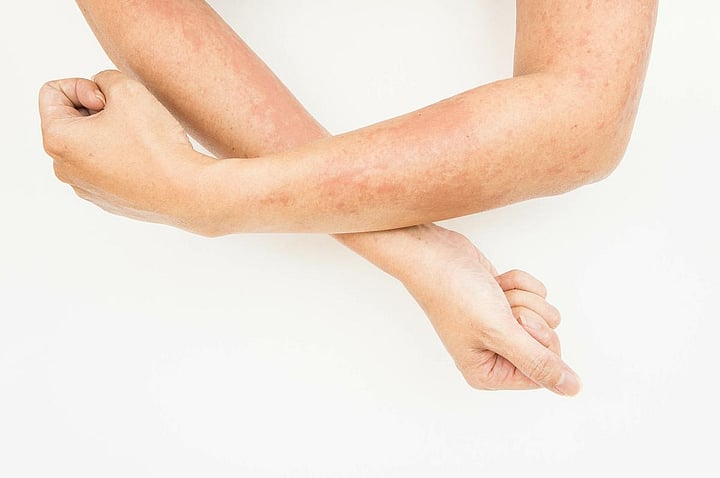多汗症と敏感肌の関係性
多汗症の影響を受けた部位、受けなかった部位の両方に敏感肌が発生
米ジョージ・ワシントン大学医学・保健科学部のErika T. McCormick氏らは、PHH患者637人を対象に調査を行い、多汗症と敏感肌の症状の負荷を評価した。この調査は国際多汗症学会(International Hyperhidrosis Society)により公表された。ランダムフォレスト機械学習アルゴリズムを使用して、敏感肌の予測分類モデルを構築した。
解析の結果、回答者の89%が敏感肌を報告しており、多汗症と敏感肌の重症度スコアが有意に関連していることが確認された。敏感肌は、多汗症の影響を受けた部位と受けなかった部位の両方で発生していた。このコホートにおける敏感肌の予測には、検証済みのSensitive Scale-10質問票が最も役立った。
同じくジョージ・ワシントン大学の筆頭著者であるAdam Friedman氏は、「機械学習モデルを使用した私たちの研究では、原発性多汗症の人は、過度の発汗がない部位でも、一般の人よりも敏感肌である可能性が高いことが初めて確認された。これは、皮膚科医が患者とよりよいパートナーシップを築くための準備を助けるとともに、過度の発汗に悩む患者において、敏感肌を特定して管理するよう導くことができる。そして、共通の疾患メカニズムを明らかにし、新しい治療法の促進に役立つ可能性がある」と述べている。
なお複数人の著者が、本研究に資金提供したガルデルマ社との利益相反(COI)に関する情報を明らかにしている。
Journal of Drugs in Dermatology


Relationship Suggested Between Hyperhidrosis, Sensitive Skin
Sensitive skin occurred on body sites that were and were not affected by hyperhidrosis
TUESDAY, Oct. 15, 2024 (HealthDay News) -- Sensitive skin (SS) seems to be associated with primary hyperhidrosis (PHH), according to a study published online Sept. 30 in the Journal of Drugs in Dermatology.
Erika T. McCormick, from the George Washington University School of Medicine and Health Sciences in Washington, D.C., and colleagues surveyed 637 PHH sufferers to assess HH and SS symptom burden. The survey was disseminated by the International Hyperhidrosis Society. Random forest machine learning algorithms were used to build a predictive classification model for SS.
The researchers found that 89 percent of the respondents reported SS; and HH and SS severity scores were significantly associated. SS occurred on body sites that were and were not affected by HH. For predicting SS in this cohort, the Sensitive Scale-10 validated questionnaire was most helpful.
"Our study, using machine learning models, confirmed for the first time that someone with primary hyperhidrosis is more likely to have sensitive skin than the general public, even in areas where there is no excessive sweating," lead author Adam Friedman, M.D., also from George Washington University, said in a statement. "This could help prepare dermatologists to better partner with their patients, educate, identify and manage sensitive skin in patients suffering from excessive sweating, and highlight shared disease mechanisms which may help facilitate new treatment approaches."
Several authors disclosed ties to Galderma, which funded the study.
Journal of Drugs in Dermatology


